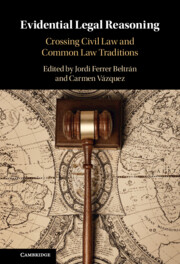Book contents
- Evidential Legal Reasoning
- Evidential Legal Reasoning
- Copyright page
- Contents
- Figures
- Tables
- Contributors
- Introduction
- Part I Evidence As an Area of Knowledge
- Part II Convergences between Systems
- 3 The Transformation of Chinese Evidence Theories and System
- 4 Truth Finding and the Mirage of Inquisitorial Process
- 5 Evidential Remedies for Procedural Rights Violations
- 6 Common Law Evidence and the Common Law of Human Rights
- Part III On Evidential Inferences
- Part IV Expert Evidence
- Part V Standards of Evidence As Decision-Making Rules
- Index
- References
4 - Truth Finding and the Mirage of Inquisitorial Process
from Part II - Convergences between Systems
Published online by Cambridge University Press: 05 May 2022
- Evidential Legal Reasoning
- Evidential Legal Reasoning
- Copyright page
- Contents
- Figures
- Tables
- Contributors
- Introduction
- Part I Evidence As an Area of Knowledge
- Part II Convergences between Systems
- 3 The Transformation of Chinese Evidence Theories and System
- 4 Truth Finding and the Mirage of Inquisitorial Process
- 5 Evidential Remedies for Procedural Rights Violations
- 6 Common Law Evidence and the Common Law of Human Rights
- Part III On Evidential Inferences
- Part IV Expert Evidence
- Part V Standards of Evidence As Decision-Making Rules
- Index
- References
Summary
My argument is that it is impossible for a judge to both provide unrepresented and poorly qualified litigants with meaningful legal assistance while at the same time avoiding impartiality. The English system of civil justice offers poor access to litigants of limited means. This has been the case for a long time, but the problem has become even more serious since the abolition of legal aid in civil cases and there it is now urgent to address it. The strategy that seems to appeal to the legislator favours procedures that can be conducted without the involvement of professional advocates, of inquisitorial proceedings. This strategy is misconceived. While there is much to be said for simplifying the litigation system through use of technology, online resources and other labour-saving measures, there is no substitute for adversarial process.
- Type
- Chapter
- Information
- Evidential Legal ReasoningCrossing Civil Law and Common Law Traditions, pp. 71 - 83Publisher: Cambridge University PressPrint publication year: 2022



